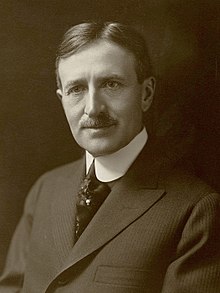 |
| Harvey Samuel Firestone , Founder of Firestone Tire and Rubber Company Photo credit:https://en.wikipedia.org/wiki/Harvey_Samuel_Firestone |
In 1900, Harvey Firestone established the Firestone Tire and Rubber Company while Henry Ford founded the Ford Motor Company and started doing business with his Detroit neighbor, Firestone in 1906.
Both companies became major industry players in their own fields, with Firestone later on merging with Bridgestone Americas Inc., a company that supplies tires for motorcycles, light trucks, vehicles for passenger, commercial, off road and agricultural purposes. Ford on the other hand became a global auto manufacturer and owner of premium and luxury vehicle brands such as Ford, Volvo, Lincoln and Mercury.
In 1978, the largest tire recall in history happened wherein Firestone recalled 14.5 million tires and paid $500,000 fine for concealing safety problems.
Furthermore, in early 2000, the National Highway Traffic Safety Administration (NHTSA) started to take action on complaints of Firestone's tire tread separation most of them on Ford Explorer sport utility vehicles (SUV). On August 9, 2000, a recall of 6.5 million tires was announced by both Ford and Firestone.
 |
| Henry Ford, an American industrialist and founder of Ford Motor Company Photo Credit:https://en.wikipedia.org/wiki/Henry_Ford |
On our SWOT Analysis.Ford's Strengths: Ford has a strong position in the US market; Ford has a good financial performance; Ford has a significant growth in China;
Firestone's Strengths: It has a well established brand name; Its products are well diversified.
On Ford's Weakness: It had a high cost structure; It has poor performance in European sales; It has weak environmental records.
On Firestone's Weakness: It has limited market share; It was known in the past for its largest tire recall in history at 14.5 million tires in 1978; the tire recall has weakened the financial position of the company.
On Ford' s Opportunities: It has strategic partnership with companies needed for its production.
On Firestone's Opportunities: Globalization; Growing initiatives in promoting pro-environment friendly products.
On Ford's Threats: Rising raw materials prices; Increasing competition of car dealers; Government regulations are becoming more strict and complex;
On Firestone's Threats: Government regulations are becoming more strict and complex; Increased competition.
Our group's statement of the problem was: How could Ford and Firestone manage the crisis on their product's safety issues ethically?
Our objectives are as follows: To be able to manage the crisis on the safety features of the company's products; To rebuild the trust of their customers and general public; To identify the issues resulting from unethical practices in their processes; To build continuing trust and confidence with the key stakeholders.
Organizational behavior: Both companies are not admitting to any fault and they are trying to save their own companies from the growing issues.
Business Ethics: It is clear that there is violation of good business ethics by both companies. They neglected certain early warning signs about their respective products which could have been prevented if they addressed the early signs. Moreover, the responsibilities that were not shared by Ford and Firestone affected their businesses and resulted to loss of customers and loss of trust for the partnership of both companies.
For the best alternative course of action (ACA): We highly recommend the: The total recall of the defective products, collaborate with each other in designing safer products and structure after sales service.
Pros: This ACA could possible prevent the occurrence of the accidents to the customers; Trust and confidence to the companies by its customers will be regained. No further issue affecting the companies' name and reputation; Total quality of the products will be assured and monitored.
Cons: Conflicts may result due to diversified opinions; the companies may need to put a large amount of investment into research and development; Total recall would mean additional cost to the company; Development of new designs to replace the recalled items require additional costs or more.
Best solution, Recommendation and Conclusion: Both companies should do a total recall of the defective products, collaborate with each other in designing safer products and structure after sales service.
Action Plan: Do the Plan - Do- Check - Action (PDCA) cycle or the Deming Cycle.
Plan: Identify the strategies for total recall of the products by both companies;Identify other necessary counter measures and legal implications of the action to be taken; Identify the manpower availability to be part of the team designing safer products and structure after sales service.
 |
| PDCA Cycle Source: The W. Edwards Deming Institute/ https://www.mindtools.com/pages/article/newPPM_89.htm |
Do: (1) Involve all the responsible leaders and others in action to be taken and the design of safer products and structure for an after sales service. (2) Provide proper training to all members of the team and revisit company policies as to operations and handling of the same issue. (3) Release an internal communication to all employees and internal audiences regarding the new policies, if any, to make everyone be aware of the actions taken. (4) Develop series of scenarios that anticipate the crisis the organization may face, for exercise purposes, and also consult with lawyers for any further implications.
Check: (1) Review the plan regularly; (2) Consider meeting between Ford and Firestone and ensure open communication as to responsibilities and avoid blaming each other ; (3) Conduct surveys internally and externally regarding result of the plan.
Act: (1) Strive for a timely and consistent flow of information to both internal and external audiences; (2) Continue collaborating with the stakeholders and work on partnership between Ford and Firestone to work on the action plan.
Since this is a cycle, if in case the changes were not successful, learning should be taken into consideration before starting the PDCA cycle again. Also while doing the each action in the cycle, continuous improvement remains to be a constant.
No comments:
Post a Comment